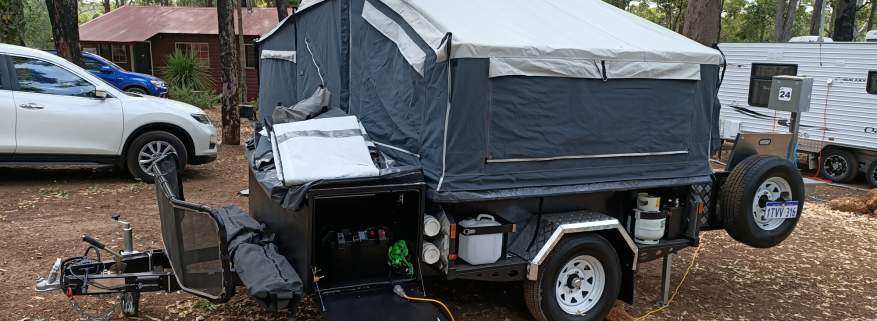Camper Trailer Towing Guide

The last thing you want is to have your getaway end early because something has gone wrong.
Towing requires a greater degree of skill than normal driving. You have extra weight behind you and your driving may need some slight adjustments.
Most 4X4’s won’t have trouble towing a camper trailer, however, some smaller cars might find it tough, especially driving up steep hills or around tight corners. Check your vehicles manual for the towing capacity.
When towing, you should:
- Allow for the extra length and width of the trailer when entering traffic, turning corners, coming to a stop, changing lanes and parking.
- Hit the road early! You’ll arrive at your destination earlier with more daylight hours to actually enjoy it & you’re more likely to avoid heavy traffic.
- Kangaroos and emus are most active around dawn and early evening. Plan your leave time to lower your chance of running into a Kangaroo.
- Apply the accelerator, brakes, steering smoothly and gently to avoid sway, especially in wet or slippery conditions.
- You will have felt the wind from passing trucks before. You may have gripped the steering wheel tighter. The same can happen with your camper. It will probably be just a slight shake, but if it caught unaware it could give you a scare.
- It’s quite common to come across domestic & Australian wildlife on the road. Unfortunately, swerving can result in real danger, so try to avoid this at all costs. Any sudden vehicle movements or direction changes with your camper behind you could end badly.
- Try to plan ahead by checking weather forecasts. When the wind gets bad you should get off the road. Stay safe and start off again tomorrow. The great thing about a camper trailer is you can stop and spend the night wherever you need to.
- To avoid your camper swaying all over the place, make sure the weight inside is distributed evenly. Incorrectly loading your trailer can contribute significantly to stability and sway related issues.
- Maintain a safe distance between you and the vehicle in front to allow for a longer stopping distance.
- Engage a lower gear in manual and automatic vehicles to increase vehicle control and reduce brake strain when travelling downhill.
- Your vehicle’s capacity to accelerate may have been reduced towing a camper trailer. Allow more time and a greater distance in which to overtake.
- Towing is more stressful than normal driving and is more likely to cause fatigue. Therefore, more rest stops should be planned.
- It is important to consider the effect of loads such as luggage portable fridges on the towing vehicle.
- Remember you’re towing a trailer, so your driving speed should be reduced and adjusted accordingly.
Things to watch for while travelling & during driving breaks:
- Check the couplings & chains are still securely fastened
- Check that the light connections are still secure and that all lights are working.
- Check that the tyres are still sufficiently inflated.
- Pay attention to the places you have travelled recently, this will give you the best indication of potential issues that may arise when towing (i.e. after being on a gravel road the gravel can lodge itself in your wheel making a knocking sound).
- Pay extra attention to where the axle meets the wheel bearing as this is the most likely place for a fracture to occur.
- Check to see if one of your tyres is facing out or if you have uneven tread wear.
- Check the correct tyre pressure on both the trailer and tow vehicle. It can in some cases lead to instability on the road.
Patience & Courtesy
We’ve all been stuck behind a slow trailer or caravan. If that’s something you get annoyed at, then it might be something that frustrates you when you are the campertrailer driver with people behind you. The key in both instances is patience & courtesy.
If you are enjoying the countryside or your camper trailer is a little heavy, then it’s always good manners to pull over & let other vehicles pass you. Don’t get frustrated by their impatience, because you’ve probably been there before. Patience & courtesy. Australian roads offer lots of opportunities for those cars to overtake you.
Electric Brake Controller
Our camper trailer has been fitted with electric brakes and you’ll have been supplied with a brake controller when you hitched up. For trailers over 750kg, they are required by law. The added weight of the camper can make slowing down or stopping the tow vehicle dangerous as the trailer’s momentum can cause it to keep going. An electric brake controller eliminates this risk by activating the trailer’s brakes when the driver of the tow vehicle hits the brake pedal.
26 Feb 2021

